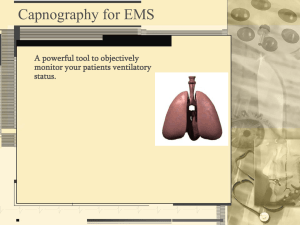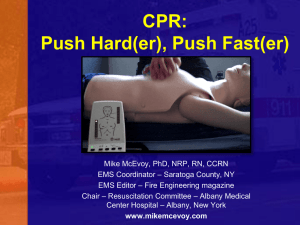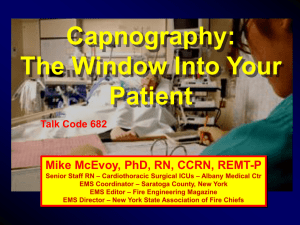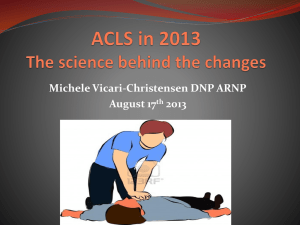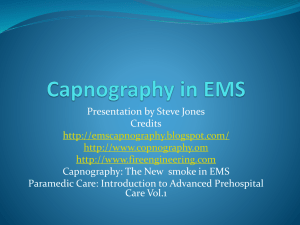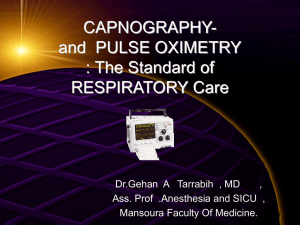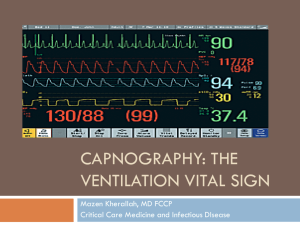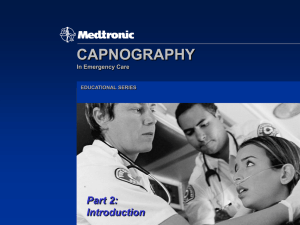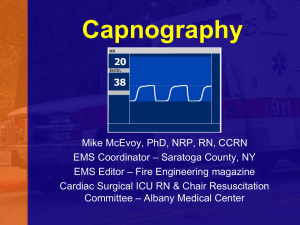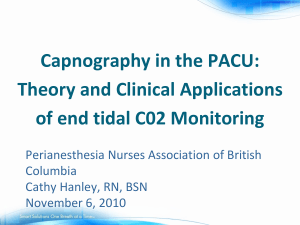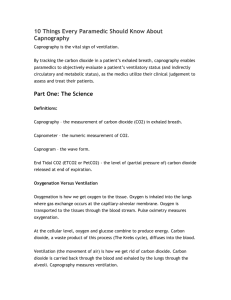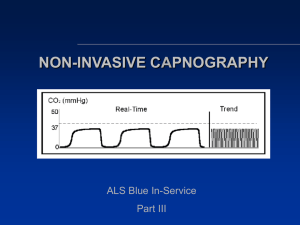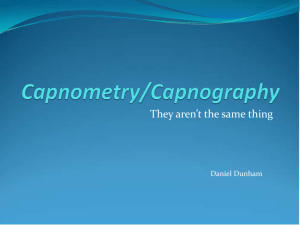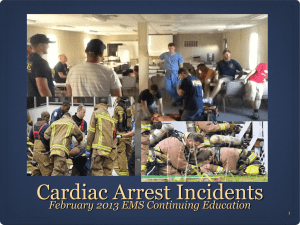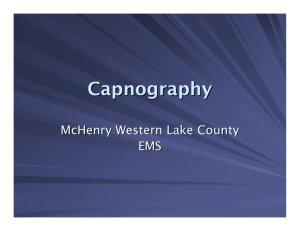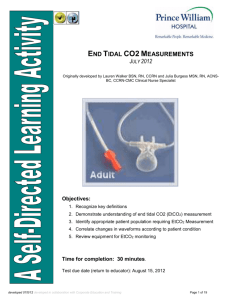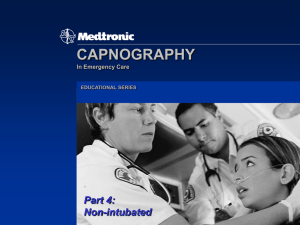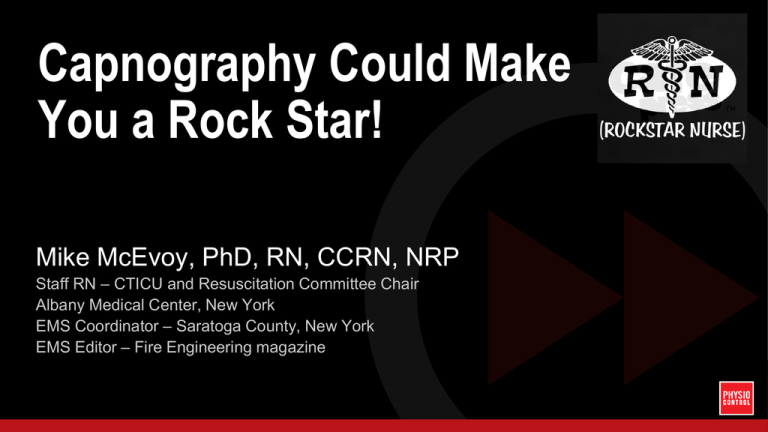
Capnography Could Make
You a Rock Star!
Mike McEvoy, PhD, RN, CCRN, NRP
Staff RN – CTICU and Resuscitation Committee Chair
Albany Medical Center, New York
EMS Coordinator – Saratoga County, New York
EMS Editor – Fire Engineering magazine
Learning Objectives
Upon completion of the presentation the participant will
Explain the physiology of capnography
Discuss the clinical value of capnography in improving
patient outcomes
Recall the role of capnography in the Guidelines for Emergency
Cardiac Care and CPR
What is Capnography?
Available for spontaneously breathing
and for intubated patients
Uses Circuit Plugged into Monitor
Produces Waveform
Capnography
“Capnos” = Greek for smoke
From the “fire of life” metabolism
CO2 = the waste product of metabolism
Carbon Dioxide is a compound molecule
2 oxygen + 1 carbon
0.03% concentration in room air
Odorless; heavier than air
Green plants scavenge excess CO2
Physiology of Metabolism
Oxygen Lungs alveoli blood
Breath
CO2
Muscles + Organs
Lungs
Oxygen
CO2
Blood
Oxygen
ENERGY
CO2
Cells
Oxygen
+
Glucose
SpO2 versus EtCO2
Oxygenation (Pulse Ox)
Ventilation (Capnography)
O2 for metabolism
SpO2 measures
% of O2 in RBCs
Changes within 5 minutes
CO2 from metabolism
EtCO2 measures exhaled CO2
at point of exit
Changes within 10 seconds
Physiology of Metabolism
Oxygen Lungs alveoli blood
Breath
CO2
Muscles + Organs
Lungs
Oxygen
CO2
Blood
Oxygen
ENERGY
CO2
Cells
Oxygen
+
Glucose
Normal Capnography Waveform
45
0
Normal range is 35-45 mmHg
Height = total CO2
Length = time/rate
Capnography Waveforms
Normal
Hyperventilation
Hypoventilation
45
0
45
0
45
0
Capnogram Phases
C
A
D
B
End-tidal
E
Inhale
Capnogram Phases
C
A
D
B
Begin Exhale (dead space)
End-tidal
E
Capnogram Phases
C
A
D
B
End Exhale (plateau)
End-tidal
E
Capnogram Phases
C
A
B
D
End-tidal
E
End of the Wave of Exhalation
What Happened?
The tube came out!
Sp02
98
What about the Pulse Ox?
Waveform Shape
Bronchospasm (Asthma)
Mild
Moderate
Test
Capnography waveforms
45
0
45
0
45
0
45
0
Normal
Hyperventilation
Hypoventilation
Bronchospasm
Guidelines 2000
EtCO2 can be useful as a non-invasive indicator
of cardiac output generated during CPR
Carbon Dioxide (CO2) Production
What If…
But, with High-Quality CPR…
Meet Howard Snitzer
54-years old, collapsed Jan 5, 2011
outside Don’s Foods in Goodhue, MN
(pop. 900)
2 dozens rescuers took turns providing
CPR for 96 minutes
6 shocks with first responder AED,
6 more shocks by Mayo Clinic
Air Flight Medics
Transported to Mayo Clinic Cardiac
Cath Lab
Why Not Quit?
Thrombectomy and
stent to LAD
10 days in Mayo Clinic
“The capnography
told us not to give up”
EtCO2 averaged 35
(range 32 – 37)
Decision to Call the Code
120 prehospital patients in non-traumatic cardiac arrest
EtCO2 had 90% sensitivity in predicting ROSC
Maximal level of <10mmHg during the first 20 minutes
after intubation was never associated with ROSC
*Source: Canitneau J. P. 1996. End-tidal carbon dioxide during cardiopulmonary resuscitation in humans presenting mostly with asystole, Critical Care Medicine 24: 791-796
So What’s the Goal During CPR?
Try to maintain a
minimum EtCO2 of 10
Push
HARD (> 2”)
FAST (at least 100)
Change rescuer
Every 2 minutes
AHA Hospital Guidelines – just released (2013)
Pre, Intra, Post arrest recommendations:
1. Real time feedback at the point of care
2. Shock early, don’t interrupt CPR, avoid
hyperventilation, optimize depth
3. BENCHMARK
AHA Hospital Guidelines – just released (2013)
Pre, Intra, Post arrest recommendations:
1. Real time feedback at the point of care
2. Shock early, don’t interrupt CPR, avoid
hyperventilation, optimize depth
3. BENCHMARK
AHA Guidelines – just released (2013)
Pre, Intra, Post arrest recommendations:
1. Real time feedback at the point of care
2. Shock early, don’t interrupt CPR, avoid
hyperventilation, optimize depth
3. BENCHMARK
AHA Guidelines – just released (2013)
Pre, Intra, Post arrest recommendations:
1. Real time feedback at the point of care
2. Shock early, don’t interrupt CPR, avoid
hyperventilation, optimize depth
3. BENCHMARK
AHA Guidelines – just released (2013)
Pre, Intra, Post arrest recommendations:
1. Real time feedback at the point of care
2. Shock early, don’t interrupt CPR, avoid
hyperventilation, optimize depth
3. BENCHMARK
Anesthesia
What Should Happen
Lungs (Good)
$tomach (Bad, Very Bad)
Anesthesia Litigation
Respiratory Damaging Events
60%
50%
40%
30%
20%
10%
0%
1970's
1980's
American Society for Anesthesiologists: Closed Claims Project Database, 2010
1990's
2000's
The Answer? Capnography
Colorimetric
Capnometry
Waveform Capnography
Oct 1986 – American Society of Anesthesiology (ASA)
Capnography = basic standard of care for intra-operative monitoring
Recent Need for EtCO2
Guidelines 2005
EtCO2 recommended to
confirm ET tube placement
Capnography Detects ROSC
Indications of Return of Spontaneous Circulation
Sudden, sustained rise in EtCO2 from baseline
Can occur before pulse or blood pressure are palpable
EtCO2 to Detect ROSC
90 pre-hospital intubated arrest patients
16 survivors
13 survivors: Rapid rise in exhaled CO2 was the earliest
indicator of ROSC
Before pulse or blood pressure were palpable
Wayne MA, Levine RL, Miller CC. “Use of End-tidal Carbon Dioxide to Predict Outcome in Prehospital Cardiac Arrest” . Annals of Emergency Medicine. 1995; 25(6):762-767.
Levine RL., Wayne MA., Miller CC. “End-tidal carbon dioxide and outcome of out-of-hospital cardiac arrest.” New England Journal of Medicine. 1997;337(5):301-306.
Guidelines 2010
Continuous quantitative waveform capnography
recommended for intubated patients throughout
peri-arrest period
In adults:
1. Confirm ETT placement
2. Monitor CPR quality
3. Detect ROSC with EtCO2 values
Guidelines 2010
Evidence
Capnography Classes and Levels of Evidence
1.Confirm ETT placement: Class I, LOE A
2.Monitor CPR quality: Class IIb, LOE C
3.Detect ROSC with EtCO2 values: Class IIa, LOE B
Definition of Classes and Levels of Evidence Used in AHA Recommendations
Class I Conditions for which there is evidence for and/or general agreement that the procedure or treatment is useful and effective.
Class II Conditions for which there is conflicting evidence and/or a divergence of opinion about the usefulness/efficacy of a procedure
or treatment.
Class IIa The weight of evidence or opinion is in favor of the procedure or treatment.
Class IIb Usefulness/efficacy is less well established by evidence or opinion.
Class III Conditions for which there is evidence and/or general agreement that the procedure or treatment is not useful/effective and in
some cases may be harmful.
Therapeutic Recommendations
Level of Evidence A Data derived from multiple randomized clinical trials or meta-analyses
Level of Evidence B Data derived from a single randomized trial or nonrandomized studies
Level of Evidence C Consensus opinion of experts, case studies, or standard of care
Diagnostic Recommendations
Level of Evidence A Data derived from multiple prospective cohort studies using a reference standard applied by a masked evaluator
Level of Evidence B Data derived from a single grade A study, or one or more case-control studies, or studies using a reference
standard applied by an unmasked evaluator
Level of Evidence C Consensus opinion of experts
©2010 American Heart Association, Inc. All rights reserved.
Goldstein et al. Published online in Stroke Dec. 2, 2010
Classes of Evidence
I. Standard of care: Just do it!
II. Conflicting evidence: Maybe, maybe not
IIa. Evidence favors benefit – Do it
IIb. Evidence not so favorable – Think first
III. Not useful, maybe harmful: Don’t do it
Levels of Evidence
Proof
A. A whole lotta proof: Best!
B. Some proof: Better than nothing
C. No proof: But some like the idea
Guidelines 2010
Evidence
Capnography Classes and Levels of Evidence
1. Confirm ETT placement: Class I, LOE A
Just do it, best proof
2. Monitor CPR quality: Class IIb, LOE C
Think first, some like the idea
3. Detect ROSC with EtCO2 values: Class IIa, LOE B
Do it, better than nothin’
Must We Follow Evidence?
BMJ, Dec 2003
Published cases of survivors falling
from airplanes
No published evidence parachutes
actually work
Guidelines 2010
Evidence
Capnography Classes and Levels of Evidence
1. Confirm ETT placement: Class I, LOE A
Just do it, best proof
2. Monitor CPR quality: Class IIb, LOE C
Think first, some like the idea
3. Detect ROSC with EtCO2 values: Class IIa, LOE B
Do it, better than nothin’
TrueCPR®
Questions?


